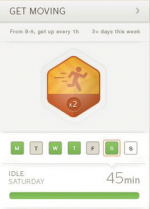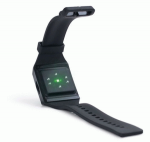
For Quantified Self devotees, data hounds and fitness enthusiasts, it’s a good time to be alive. Recent improvements in sensor technology, battery life and connectivity (and lower costs) have given rise to a slew of wearable gadgets and apps that make it easy to track and make sense of our health data. Yet, as the space heats up and gets noisier, some have begun to ask: Do we really need another fitness watch? Basis, the makers of a new wrist-based health tracker, think so.
The venture-backed startup first revealed its long-developing tracking band over a year ago and recently pulled back the curtain on its accompanying web service. Today, Basis is finally bringing the whole kit-and-kaboodle to market, not-so-coincidentally hot on the heels of the second coming of Jawbone’s UP.
On sale beginning this morning, priced at $200, the Basis band and dashboard allow users to continuously measure their motion, skin temperature, heart rate, calories burned, sleep patterns, and other physiological indicators. The device itself, which will initially be available in white and black, offers an LCD touchscreen interface that displays the date and time just like your trusty old wrist watch, along with an estimated 4-day battery life. The fitness watch also includes BlueTooth support, which the company will begin activating when it releases its mobile apps — expected sometime in the near future.
For starters, what makes the device stand out (and why Basis thinks there’s room for another player in this space) is that it comes loaded with sensors. Beyond pulling data from its 3-axis, built-in accelerometer (that measures sleep patterns), the band comes with an optical scanner to track blood flow (and heart rate), along with a perspiration, skin and ambient temperature monitors that aim to characterize workout intensity and heat dissipation among other things.
While the four input channels seem like they come with the potential for information overload, the company is assuaging those fears with a web interface that works to streamline your multivariate health data into an easy-to-consume (and understand) interface, including the familiar metrics like calories burned and hours slept.
Basis CEO Jef Holove says that the problem with most current offerings is that they rely too heavily on the accelerometer and require too much manual data entry. As a result, many users who take to these devices start out excited but quickly give up, relying on memory or wishful thinking to stay at it. This poor retention emanates from a weak foundation, he says, as apps need not just to be focused on data collection but what to do with it.
The great “so what?” question when it comes to health tracking. People need a way to maintain their motivation and that comes from seeing progress and real gains in whatever it may be — the amount of sleep they get each night, the number of push-ups they can manage without having a hernia or simply the amount of steps they take each day.
Holove says that the team has designed Basis to reduce friction via automatic tracking, classification and uploading, by offering relevant insight and feedback loops so users can see how they progress over time (both short and long term) and finally the ability to make small, concrete actions that (when added up over time) result in positive health outcomes. Not only that, but really the biggest point of friction is that health tracking systems require users to go too far out of their way to change their habits. Systems, then, have to adjust to the ups and downs of real life.
Updating



